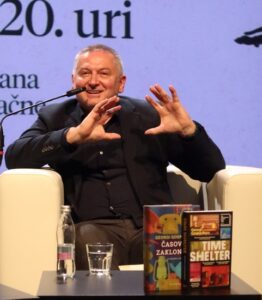The Expert Jury for the Vilenica Prize, composed of Gregor Podlogar (jury president), Aljaž Koprivnikar (vice president), Veronika Dintinjana, Ludwig Hartinger, Martin Lissiach, Aleš Mustar, Tone Peršak, Diana Pungeršič, Sašo Puljarević, Jutka Rudaš, and Đurđa Strsoglavec, awards the 2025 Vilenica Prize to Georgi Gospodinov.
About the Laureate:
Georgi Gospodinov is a writer, poet, essayist, playwright, editor, columnist, and literary scholar. Born in 1968 in Yambol, Bulgaria, he has devoted himself entirely to literature since his university studies. He works at the Institute for Bulgarian Literature, is a corresponding member of the Bulgarian Academy of Sciences, and a university professor. His work has been translated into more than 25 languages and is highly regarded by both readers and critics for its innovative narrative style, thematic depth, and sensitivity to the interweaving of personal and collective history.
Gospodinov is undoubtedly one of the most important and recognizable contemporary European writers. He broke onto the international literary scene with the novel Natural Novel (1999), considered a milestone in modern Bulgarian literature. His novel The Physics of Sorrow (2012), which intertwines the myth of the Minotaur with the personal and political history of Eastern Europe, became a literary phenomenon and brought him global acclaim. In 2023, he received the International Booker Prize for his novel Time Shelter, which deals with collective memory, nostalgia, and the social consequences of historical revisionism.
Award Justification:
prepared by the jury president Gregor Podlogar
The Bulgarian writer, poet, essayist, and playwright Georgi Gospodinov (born in 1968 in Yambol) is one of the central figures of respectable contemporary European literature. Although Gospodinov began his literary career as a poet—publishing his first poetry collection Lapidarium in 1992—he gained true international recognition through his prose. His prose debut, Natural Novel (1999), brought a fresh and original impulse to contemporary Bulgarian literature. It was well received by both critics and readers and was soon translated into numerous languages, including Slovenian (2005).
Beyond the labels of postmodernist writing that some attach to his work, this short novel comes to life through a natural simplicity, reflected in its complexity, that captivates the reader. His second novel, The Physics of Sorrow (2011, Slovenian translation 2015), which has received multiple awards—including being named Novel of the Year in Bulgaria—is characterized by its structure of small stories and diverse narrative techniques. The boy protagonist’s ability to empathize and embody others is unusual, subtle, and deeply moving. The novel proves that literature does not merely describe the world but is itself a world and its history.
This also applies to his third novel, Time Shelter (2020, Slovenian translation 2022), which was awarded the prestigious International Booker Prize. The book shifts between different narrative levels and satirically confronts us with one of the key (social) questions of our time: how do we live with a critical lack of future? Georgi Gospodinov is a master of contemporary novel-writing. His work, obsessed with social and historical events and centered on the invisible individual, is at times unpredictable and fragmented, yet it masterfully blends into a whole—sensitive, even tender, and imbued with (dark) humor.
In short, Georgi Gospodinov, the 40th laureate of the Vilenica Festival, embodies its legacy in his own unique way and sets an example of how literature can still convincingly speak to everyone today.

